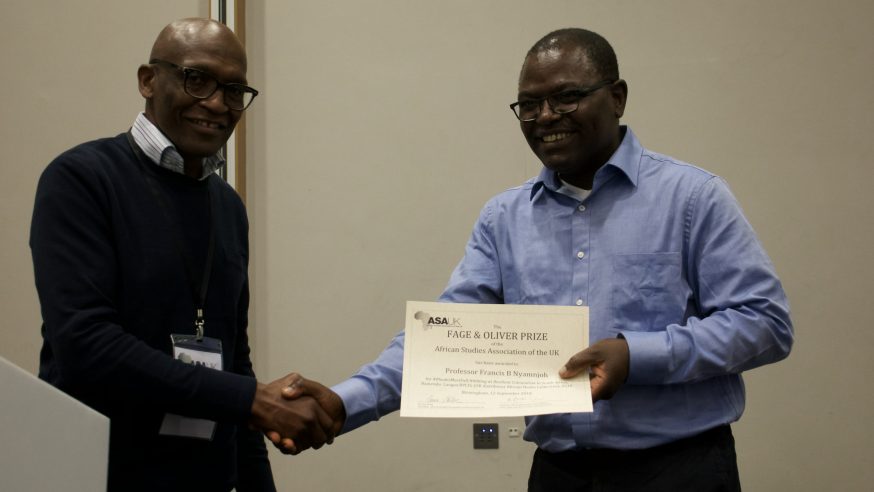The winner of the 2018 Fage and Oliver Prize is Francis B Nyamnjoh, for #RhodesMustFall: Nibbling at Resilient Colonialism in South Africa (Bamenda: Langaa RPCIG, 2016)
Congratulations!
Professor Nyamnjoh attended the 2018 ASAUK conference at the University of Birmingham. He offered the following thoughts on his award:
“Let me start by thanking the organisers of ASAUK 2018 – Dr Insa Nolte and her team at the University of Birmingham, as well as the members of the committee for the Fage & Oliver Prize for 2018. I felt truly honoured and inspired by the Fage & Oliver Prize for my 2016 monograph, #RhodesMustFall: Nibbling at Resilient Colonialism in South Africa. I accepted the award in recognition of the pioneering emphasis by John Donnelly Fage and Roland Oliver on rich ethnographic accounts of a dynamic Africa in conversation with a nimble-footed world of unequal encounters. In light of the challenges highlighted by the RhodesMustFall student movement at UCT, across South Africa, and in Oxford and beyond, I see the award as an emphatic encouragement for me to continue to research and encourage research on the challenges and need to bring into productive conversations of different traditions of knowing and knowledge production in our quest to understand Africa and Africans in their nuanced complexities. In this regard, the need to invest in critical intergenerational conversations on the meaning of Africa in historical perspective that is sensitive to the multiple sensibilities of being and becoming African, cannot be overstated. Doing justice to such a weighty imperative requires an alertness to the normalcy of the humility of incompleteness and the universality of mobility.
Lastly, I see the award as a recognition for the study of interconnections. Among many an ordinary African in many a community in rural and urban Africa, the belief in interconnections and in inclusivity is deep and strong. Individuals are actively encouraged to stay connected in and with their humanity, whatever their personal achievements, and whatever the challenges or predicaments confronting them. African students and scholars interested in rethinking African social sciences and humanities could maximise and capitalise upon the currency of conviviality in popular African ideas of reality and social action. Conviviality invites us to celebrate and preserve incompleteness and mitigate delusions of grandeur that come with ambitions and claims of perfection. As I have argued in #RhodesMustFall, nothing short of convivial scholarship would do justice to the legitimate quest for a reconfiguration of African universities and disciplines of knowledge championed by the student movements of 2015.
A truly convivial scholarship doesn’t seek, the way Cecil Rhodes and Paul Kruger did, to define and confine Africans into particular territories or geographies, racial and ethnic categories, classes, genders, generations, religions or whatever other identity marker is in vogue. Convivial scholarship confronts and humbles the challenge of over-prescription, over-standardisation and over-prediction. It is critical and evidence-based, just as it is critical of the sources of evidence. It is a scholarship that sees the local in the global and the global in the local. It brings them into informed conversations, conscious of the hierarchies and power relations at play at both the micro and macro levels of being and becoming. Convivial scholarship challenges us – however grounded we may be in our disciplines and their logics of practice – to cultivate the disposition to be present everywhere at the same time. It’s a scholarship that cautions disciplines, their borders and gatekeepers to open up and embrace differences. With convivial scholarship, there are no final answers. Only permanent questions and ever exciting new angles of questioning.
I dedicate this award to the all the students of the #RhodesMustFall Movement, whose words and actions provided much ethnographic food for thought.”
Source: http://www.asauk.net/fage-and-oliver-prize/

